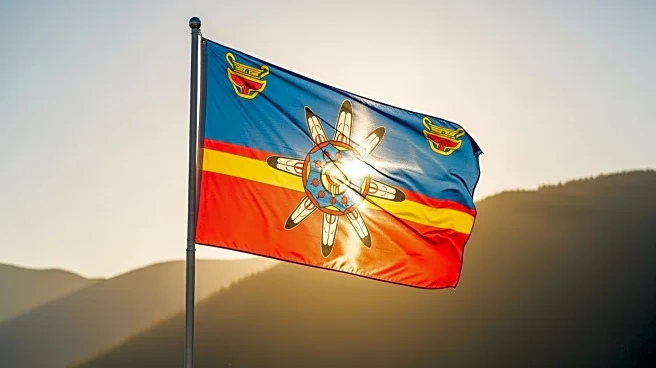What's Happening?
Okanagan College in Kelowna hosted a flag-raising ceremony to honor Truth and Reconciliation Day, attended by approximately 100 people. The event featured the re-raising of the Syilx Okanagan flag, symbolizing the ongoing relationship between the Westbank First Nation (WFN) and the college. James Coble, the dean of student services at Okanagan College, emphasized the significance of the day, while Krystal Lezard, an Indigenous knowledge keeper and artist, performed the Okanagan Song during the ceremony. The event underscored the college's commitment to fostering a welcoming environment for Indigenous students and respecting traditional territories.
Why It's Important?
The re-raising of the Syilx Okanagan flag at Okanagan College is a significant gesture in promoting reconciliation and inclusivity within educational institutions. It highlights the importance of acknowledging Indigenous cultures and histories, fostering a sense of belonging for Indigenous students. This event reflects broader efforts across Canada to address historical injustices and build stronger relationships between Indigenous communities and educational institutions. By prioritizing these values, Okanagan College sets an example for other institutions to follow, potentially influencing public policy and societal attitudes towards Indigenous peoples.
What's Next?
As the National Day of Truth and Reconciliation approaches on September 30, similar events and initiatives are expected to take place across Canada, aiming to deepen understanding and support for Indigenous communities. Educational institutions may continue to develop programs and partnerships that enhance Indigenous representation and participation. Stakeholders, including government bodies and civil society groups, are likely to engage in discussions on furthering reconciliation efforts, potentially leading to new policies or initiatives that support Indigenous education and cultural preservation.
Beyond the Headlines
The flag-raising ceremony at Okanagan College not only serves as a symbolic act of reconciliation but also raises awareness about the importance of integrating Indigenous perspectives into educational curricula. It prompts discussions on the ethical responsibilities of institutions to recognize and address historical injustices. Long-term, such initiatives could contribute to cultural shifts that prioritize inclusivity and respect for Indigenous knowledge systems, potentially influencing future generations' understanding of Canada's diverse cultural landscape.










